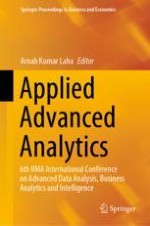2021 | OriginalPaper | Buchkapitel
Implementing Learning Analytic Tools in Predicting Students’ Performance in a Business School
verfasst von : R. Sujatha, B. Uma Maheswari
Erschienen in: Applied Advanced Analytics
Verlag: Springer Singapore
Aktivieren Sie unsere intelligente Suche, um passende Fachinhalte oder Patente zu finden.
Wählen Sie Textabschnitte aus um mit Künstlicher Intelligenz passenden Patente zu finden. powered by
Markieren Sie Textabschnitte, um KI-gestützt weitere passende Inhalte zu finden. powered by
